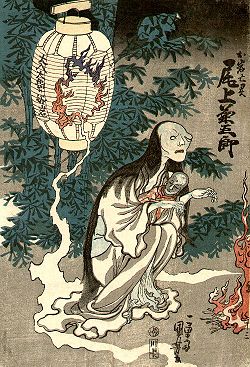
Oiwa was a woman given poison by her unfaithful husband. It disfigured her but did not kill her. She prayed to become a demon to kill her husband, his new girlfriend, and their families.
February 11, 660 BC is celebrated as the birthday of Japan as the first emperor, Jimmu, was enthroned on that day. Less gloriously, February 19, 1942 marked the beginning of the internment of Japanese Americans during World War II in the United States. Over 110,000 people living along the Pacific coast lost their businesses and property when they were moved to “relocation centers” inland.
Japan is the home of tremendous folklore and mythology, much of it unknown to Americans or Western Europeans. Japanese mythology is a complex system of beliefs that also embraces Shinto and Buddhist traditions as well as agriculture-based folk religion. Oni (demons) and yurei (ghosts) have played a role in Japanese culture for thousands of years, and stories of new spirits continue to be told today. Many stories are about hannya, which in Noh theater are women whose rage and jealousy turned them into oni while still alive.
One story about such a woman tells how Kiyohime was a young woman scorned by her lover, a monk named Anchin, who grew cold and lost interest in her. Realizing he had left her, Kiyohime followed him to a river and transformed into a serpent while swimming after his boat. Terrified by her monstrous form, Anchin sought refuge in a temple, where monks hid him beneath a bell. Not to be evaded, Kiyohime found him by his scent, coiled around the bell, and banged loudly on it with her tail. She then breathed fire onto the bell, melting it and killing Anchin.
Yuki Onna is a terrible ghost who haunts the snowy forests looking for victims. She is a kind of ghost-vampire who lives by sucking the vital energy of the human body. She extracts the soul by first freezing her victims to death, then sucking their souls out through their mouths. Some stories about Yuki Onna say that she particularly prefers the souls of children.
